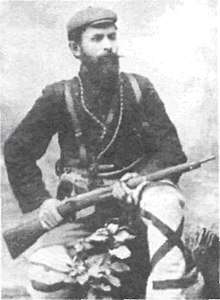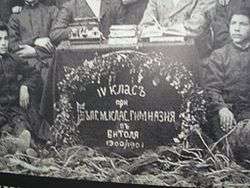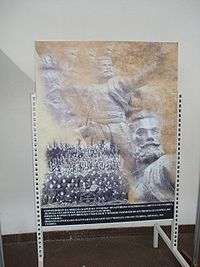Nikola Karev
| Nikola Karev Никола Карев | |
|---|---|
 | |
| President of Krusevo Republic | |
|
In office August 3, 1903 – August 13, 1903 | |
| Personal details | |
| Born |
November 23, 1877 Kırşova, Ottoman Empire (now Kruševo, Macedonia) |
| Died |
April 27, 1905 (aged 27) Village Rayçani (Koçana), Ottoman Empire (now Rajčani, Kočani, Macedonia) |
| Occupation | Revolutionary |
| Profession | Teacher |


Nikola Janakiev Karev (Bulgarian: Никола Янакиев Карев and Macedonian: Никола Карев; 1877–1905) was a revolutionary in Ottoman-ruled Macedonia. He was born November 23, 1877 in Kırşova (now Kruševo) and died April 27, 1905 in the village of Rayçani (Rajčani), both today in Republic of Macedonia. Karev was a local leader of what later became known as the Internal Macedonian Revolutionary Organization (IMRO). He was also a socialist and a member of the Bulgarian Workers' Social Democratic Party. He is considered a hero in Bulgaria, because among such activists, ethnic Bulgarian identity[1][2] coexisted with regional Macedonian one.[3][4] Despite he had Bulgarian identification,[5][6] according to the negationist Macedonian historiography,[7][8] he was ethnic Macedonian.[9]
Biography
Early years
Karev completed his early education at the Bulgarian school in Kruševo and in 1893 moved to Sofia in independent Bulgaria. There he worked as a carpenter and his employer was the socialist Vasil Glavinov. Karev joined the Socialist group led by Glavinov, and through him, made acquaintance of Dimitar Blagoev and other socialists and became a member of the Bulgarian Workers' Social Democratic Party. In 1896 the Macedonian-Adrianopole Social-Democratic Group, as part of the Bulgarian Workers' Social-Democrat Party was created, where Karev participated.[10] In 1898 Karev went back to Ottoman Macedonia and graduated from the Bulgarian Exarchate's gymnasium in Bitola. From 1900 he worked as a Bulgarian teacher in the region of Kruševo.[11]
Political and revolutionary activity
The first Conference of Macedonian Socialists was held on June 3, 1900, near Krushevo, where they defined the basic aspects of the creation of a separate Macedonian Republic, as a cantonized state, part of a future Balkan Socialist Federation, with equal rights to all its citizens.[12] They maintained the slogan "Macedonia for the Macedonians", consisting from all different nationalities, inhabiting the area, and were against the neighboring states aspirations, including Bulgarian nationalism.[13] They also saw the future Macedonia as a multinational polity, while Macedonian people was then an umbrella term covering Bulgarians, Turks, Greeks, Vlachs, Albanians, Jews, and so on.[14] In this period Karev joined the Internal Macedonian-Adrianople Revolutionary Organization and became a leader of a regional armed band (cheta). During the Ilinden uprising of August 1903, when Kruševo was captured by the rebels, Nikola Karev authored the Kruševo Manifesto, which called upon the local Muslim population to join forces with the Christians, and became the head of its provisional government. Amongst the various ethno-religious groups (millets) in Kruševo a Republican Council was elected with 60 members – 20 representatives from each one: Macedonian Bulgarians (Exarchists),[15] Aromanians (Vlachs) and Slav-speaking, Vlach-speaking and Albanian-speaking Patriarchists.[16] The Council also elected an executive body – the Provisional Government, with six members (2 from each mentioned group). The Krushevo Republic lasted only ten days, and after intense fighting it was destroyed by Ottoman forces.
After Ilinden
After the uprising Karev went back to Bulgaria and became political activist of the newly founded marxist Bulgarian Social Democratic Workers' Party (Narrow Socialists). However, the Narrows denounced the Ilinden uprising as an adventure inspired by the Bulgarian government, that played into the hands of the Great Powers. In 1904, Karev made a legal attempt to return to Macedonia, taking advantage of the Bulgarian-Ottoman Amnesty Agreement for the participants in the Ilinden Uprising. He sent several applications for amnesty to Istanbul through the cabinet of the Bulgarian Prime Minister Racho Petrov. The applications were received by the Ottoman Amnesty Commission but remained unanswered. The intercession of the Bulgarian diplomatic agent in Istanbul, Grigor Nachovich, also did not help.[17] In 1905 he was killed during an attempt to enter Ottoman Macedonia with a group of IMRO fighters.
Family
His two brothers, Petar and Georgi also participated in IMRO.[18] During the First and the Second World Wars, when Vardar Macedonia was annexed by Bulgaria, they supported the Bulgarian authorities.[19] As result, after 1944 they were imprisoned as Bulgarian fascists' collaborators in Communist Yugoslavia, where both died in the internment camp of Idrizovo in 1950 and 1951 respectively.[20]
References
- ↑ The IMARO activists saw the future autonomous Macedonia as a multinational polity, and did not pursue the self-determination of Macedonian Slavs as a separate ethnicity. Therefore, Macedonian was an umbrella term covering Bulgarians, Turks, Greeks, Vlachs, Albanians, Serbs, Jews, and so on. Historical Dictionary of Macedonia, Historical Dictionaries of Europe, Dimitar Bechev, Scarecrow Press, 2009, ISBN 0810862956, Introduction.
- ↑ "There was even an attempt to form a kind of revolutionary government led by the socialist Nikola Karev. The Krushevo manifesto was declared, assuring the population that the uprising was against the Sultan and not against Muslims in general, and that all peoples would be included. As the population of Krushevo was two-thirds hellenised Vlachs and Patriarchist Slavs, this was a wise move. Despite these promises the insurgent flew Bulgarian flags everywhere and in many places the uprising did entail attacks on Muslim Turks and Albanians who themselves organised for self defence." Who are the Macedonians? Hugh Poulton, C. Hurst & Co. Publishers, 1995, ISBN 1850652384, p. 57.
- ↑ "It would nevertheless be far-fetched to see in the Macedonian socialism an expression of national ideology... It is difficult to place the local socialist articulation of the national and social question of the late 19th and early 20th centuries entirely under the categories of today's Macedonian and Bulgarian nationalism. If Bulgarian historians today condemn the "national-nihilistic" positions of that group, their Macedonian colleagues seem frustrated by the fact that it was not "conscious" enough of Macedonians' distinct ethnic character." Entangled Histories of the Balkans – Volume Two, Roumen Daskalov, Diana Mishkova, BRILL, 2013, ISBN 9004261915, p. 503.
- ↑ An excerpt from an article from a Macedonian newspaper "Utrinski vesnik", published on 22. 07. 2000, Archive number 329. Утрински Весник, сите права задржани, Сабота, July 22, 2000 Архивски Број 329.
- Интервјуто на Никола Карев за грчкиот весник Акрополис, објавено на 8 мај 1903 година, е првото, досега познато интервју на член на најтесното раководство на ВМРО пред Илинденското востание. Овој исклучителен, слободно ќе може да се нарече, историски документ го откри и го преведе на македонски јазик г-ѓа Елефтерија Вамбаковска, вработена во Институт за национална историја. При вчерашната средба со г-ѓа Вамбаковска во редакцијата на "Утрински весник" најнапред не интересираше начинот на кој таа дошла до интервјуто. (in English) Nikola Karev's interview to the Greek newspaper "Acropolis", published on May 8, 1903, is the first, so far known interview by a member of the top leadership of the IMRO before the Ilinden Uprising. This is an exclusive, we can call it even a historical document discovered and translated into Macedonian by Mrs. Eleftheria Vambakovska working in the Institute of National History. At yesterday's meeting with Mrs. Vambakovska in the "Utrinski vesnik" we were interested in the way, she came to that interview.
- – Утрински: Како ја коментирате содржината на интервјуто. Што значи терминот бугарофрон? (in English) Utrinski: How do you interpret the content of the interview. What does the term Bulgarophronos mean?
- – Елефтерија Вамбаковска: Што се однесува до содржината на интервјуто оставам да суди науката и читателите. Мое мислење е дека тоа содржи контрадикторности и нелогичности. Интервјуто всушност и започнува со една нелогичност. Карев изјавува дека е Бугарин по убедување, а на првото прашање на новинарот: "Дали е Македонец", одговара со "да"! Самиот новинар го прогласува Карев за Македонец, но бугаризиран, а го започнува интервјуто со прашањето што е (по националност)? Се гледа дека за него поважно било етничкото потекло – дали бил Македонец, што за Грците било синоним за Грк. Инаку, тоа "по убедување" за нив не било важно – убедувањето се стекнувало и било менливо. Бугарофрон, во буквален превод би значело – човек што мисли на бугарски начин, којшто мисли како што мислат сите Бугари. Денес Грците имаат сличен термин – етникрофрон кој има слично значење, имено – човек што мисли на својата нација, односно Грк кој мисли на Грција. Денес Македонците во Егејска Македонија своите сонародници кои се погрчиле ги нарекуваат – етникофрони... (in English) Eleftheria Vambakovska: As to the content of the interview, I leave it free for interpretations by scientists and readers. My opinion is that it contains contradictory and illogical claims. The interview actually begins with an illogical claim. Karev asserts he is a Bulgarian by conviction ("Bulgarophronos"), and on the first question of the reporter: "Are you a Macedonian", he answers with "yes"! The reporter declared Karev was a Macedonian, but bulgarized one. The interview begins with a question "are you a Macedonian"? that means Karev's ethnic origin was more important for the interviewer – whether he is a "Macedonian", which to the Greeks was a synonymous of a "Greek". Otherwise, to the Greeks "(Bulgarian) by conviction" was not so important – the conviction is acquirable and it can by changed. "Bulgarophronos", literally translated would mean – a man who thinks like a Bulgarian, a man who thinks like all other Bulgarians. Today the Greeks have a similar term – ethnicophronos, which has similar meaning, namely – a man who thinks on his own nation – nationalist, a Greek who thinks about Greece. Today the Macedonians in Aegean Macedonia (Greece) call their countrymen who became hellenized, i.e. Greeks – ethnicophronos.
- ↑ Two Krusevo natives were centrally involved in the action (the insurrection organized by the IMARO in Krushevo). Nikola Karev, from the community known as Bulgarians, was the local representative to the central committee of the organization and was the military commander of the insurgent forces... Fieldwork Dilemmas: Anthropologists in Postsocialist States, Hermine G. De Soto, Nora Dudwick, Univ of Wisconsin Press, 2000, ISBN 978-0-299-16374-7, p. 37.
- ↑ Yet the identity problem was glaring, Karev reportedly addressed an assembly of 60 Bulgarian, Greek and Vlach inhabitants, to establish his “temporary government” but he referred to those assembled “brother Bulgarians”. The revolutionaries flew Bulgarian flags, killed five Greek Patriarchists, accused to be Ottoman spies, and subsequently attacked the local Muslims (Turks and Albanians). Michael Palairet, Macedonia: A Voyage through History (Vol. 2), Cambridge Scholars Publishing, 2016, ISBN 1443888494, p. 149.
- ↑ The origins of the official Macedonian national narrative are to be sought in the establishment in 1944 of the Yugoslav Republic of Macedonia. This open acknowledgment of the Macedonian national identity led to the creation of a revisionist historiography whose goal has been to affirm the existence of the Macedonian nation through the history. Macedonian historiography is revising a considerable part of ancient, medieval, and modern histories of the Balkans. Its goal is to claim for the Macedonian peoples a considerable part of what the Greeks consider Greek history and the Bulgarians Bulgarian history. The claim is that most of the Slavic population of Macedonia in the 19th and first half of the 20th century was ethnic Macedonian. For more see: Victor Roudometof, Collective Memory, National Identity, and Ethnic Conflict: Greece, Bulgaria, and the Macedonian Question, Greenwood Publishing Group, 2002, ISBN 0275976483, p. 58; Victor Roudometof, Nationalism and Identity Politics in the Balkans: Greece and the Macedonian Question in Journal of Modern Greek Studies 14.2 (1996) 253-301.
- ↑ Yugoslav Communists recognized the existence of a Macedonian nationality during WWII to quiet fears of the Macedonian population that a communist Yugoslavia would continue to follow the former Yugoslav policy of forced Serbianization. Hence, for them to recognize the inhabitants of Macedonia as Bulgarians would be tantamount to admitting that they should be part of the Bulgarian state. For that the Yugoslav Communists were most anxious to mold Macedonian history to fit their conception of Macedonian consciousness. The treatment of Macedonian history in Communist Yugoslavia had the same primary goal as the creation of the Macedonian language: to de-Bulgarize the Macedonian Slavs and to create a separate national consciousness that would inspire identification with Yugoslavia. For more see: Stephen E. Palmer, Robert R. King, Yugoslav communism and the Macedonian question, Archon Books, 1971, ISBN 0208008217, Chapter 9: The encouragement of Macedonian culture.
- ↑ The first name of the IMRO was "Bulgarian Macedonian-Adrianople Revolutionary Committees", which was later changed several times. Initially its membership was restricted only for Bulgarians. It was active not only in Macedonia but also in Thrace (the Vilayet of Adrianople). Since its early name emphasized the Bulgarian nature of the organization by linking the inhabitants of Thrace and Macedonia to Bulgaria, these facts are still difficult to be explained from the Macedonian historiography. They suggest that IMRO revolutionaries in the Ottoman period did not differentiate between ‘Macedonians’ and ‘Bulgarians’. Moreover, as their own writings attest, they often saw themselves and their compatriots as ‘Bulgarians’ and wrote in standard Bulgarian language. For more see: Brunnbauer, Ulf (2004) Historiography, Myths and the Nation in the Republic of Macedonia. In: Brunnbauer, Ulf, (ed.) (Re)Writing History. Historiography in Southeast Europe after Socialism. Studies on South East Europe, vol. 4. LIT, Münster, pp. 165-200 ISBN 382587365X.
- ↑ The politics of terror: the Macedonian liberation movements, 1893–1903, Duncan M. Perry, Duke University Press, 1988, ISBN 0-8223-0813-4, p. 172.
- ↑ Николов, Борис Й. Вътрешна Македоно-одринска революционна организация. Войводи и ръководители (1893–1934). Биографично-библиографски справочник, София 2001, с. 74
- ↑ We, the people: politics of national peculiarity in Southeastern Europe, Diana Mishkova, Central European University Press, 2009, ISBN 963-9776-28-9, p. 122.
- ↑ Terrible Fate: Ethnic Cleansing in the Making of Modern Europe, Benjamin Lieberman, Rowman & Littlefield, 2013, ISBN 144223038X, p. 56.
- ↑ Historical Dictionary of Macedonia, Historical Dictionaries of Europe, Dimitar Bechev, Scarecrow Press, 2009, ISBN 0810862956, Introduction.
- ↑ "Беше наполно прав и Мисирков во своjата фундаментална критика за Востанието и неговите раководители. Неговите укажуваньа се покажаа наполно точни во послешната практика. На пр., во ослободеното Крушево се формира градска управа составена од "Бугари", Власи и Гркомани, па во зачуваните писмени акти не фигурираат токму Македонци(!)..." Блаже Ристовски, "Столетиjа на македонската свест", Скопjе, Култура, 2001, стр. 458.
- ↑ The past in question: modern Macedonia and the uncertainties of nation, Keith Brown, Publisher Princeton University Press, 2003, ISBN 0-691-09995-2, pp. 81–82.
- ↑ Цочо Билярски, Никола Карев — председателят на Крушевската република, публикувано в Сите българи заедно на 31.01.2012.
- ↑ Македонска енциклопедија, МАНУ, Скопје, 2009, стр. 677
- ↑ Илюстрация Илинден, ноември 1941, година 13, книга 9 (129), стр. 13.
- ↑ Ристески, Стојан. Судени за Македонија (1945–1985), Полар, Охрид, 1995, стр.311–324. Archived April 7, 2014, at the Wayback Machine.
Sources
- Пандев, К. "Устави и правилници на ВМОРО преди Илинденско-Преображенското въстание", Исторически преглед, 1969, кн. I, стр. 68—80. (in Bulgarian)
- Пандев, К. "Устави и правилници на ВМОРО преди Илинденско-Преображенското въстание", Извeстия на Института за история, т. 21, 1970, стр. 250–257. (in Bulgarian)
- Битоски, Крсте, сп. "Македонско Време", Скопје – март 1997, quoting: Quoting: Public Record Office – Foreign Office 78/4951 Turkey (Bulgaria), From Elliot, 1898, Устав на ТМОРО. S. 1. published in Документи за борбата на македонскиот народ за самостојност и за национална држава, Скопје, Универзитет "Кирил и Методиј": Факултет за филозофско-историски науки, 1981, pp 331 – 333. (in Macedonian)
- Hugh Pouton Who Are the Macedonians?, C. Hurst & Co, 2000. p. 53. ISBN 1-85065-534-0
- Fikret Adanir, Die Makedonische Frage: ihre entestehung und etwicklung bis 1908., Wiessbaden 1979, p. 112.
- Duncan Perry The Politics of Terror: The Macedonian Liberation Movements, 1893–1903 , Durham, Duke University Press, 1988. pp. 40–41, 210 n. 10.
- Keith Brown,The Past in Question: Modern Macedonia and the Uncertainties of Nation, Princeton University Press, 2003.